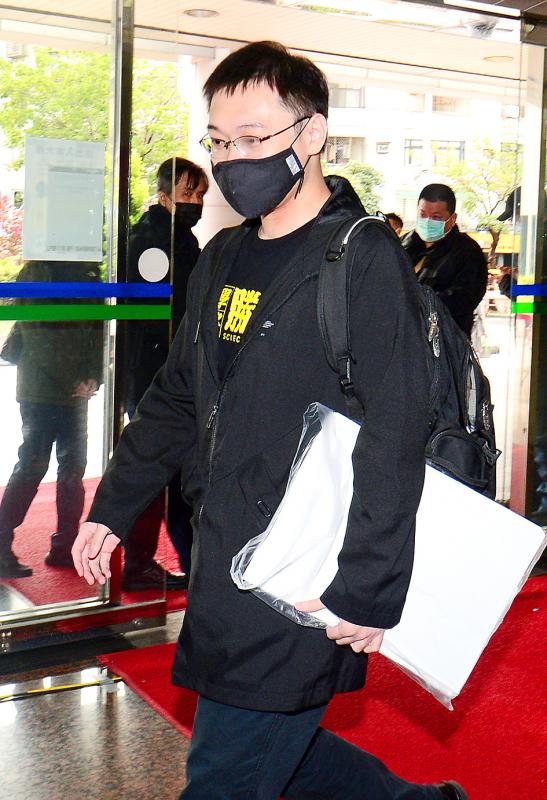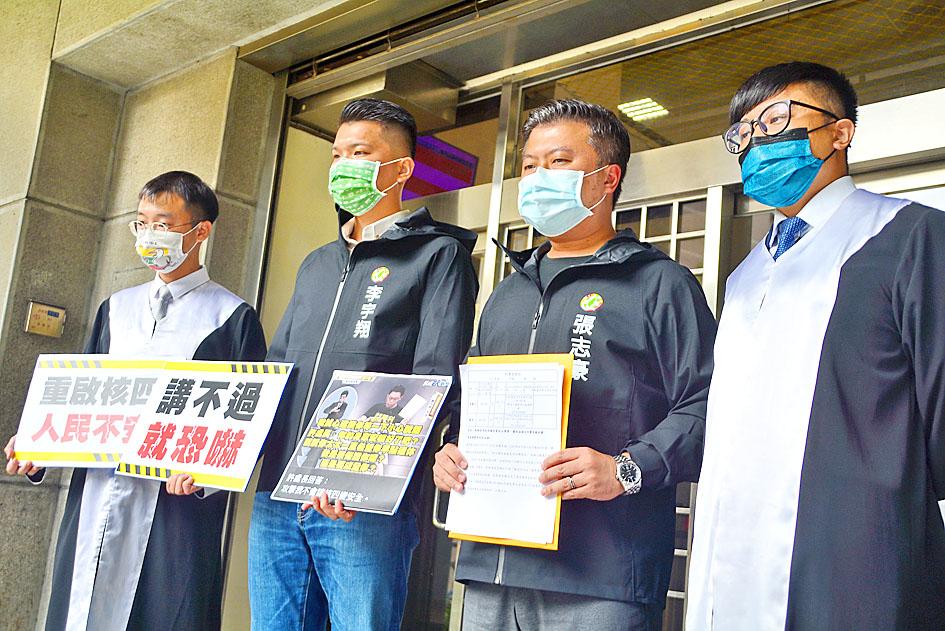A top official at the Democratic Progressive Party’s (DPP) New Taipei City branch yesterday filed a criminal intimidation charge against nuclear power proponent Huang Shih-hsiu (黃士修), a day after Huang asked a debate opponent if his “affairs are in order.”
Huang made the remarks in a televised presentation organized by the Central Election Committee over whether the mothballed Fourth Nuclear Power Plant in New Taipei City’s Gongliao District (貢寮) should be activated.
A referendum on the issue is scheduled for Dec. 18.

Photo: Wang Yi-sung, Taipei Times
Speaking with Taiwan Power Co’s (台電) Nuclear Power Division head Hsu Yung-hui (許永輝), who represented the government in opposing the initiative, Huang said: “You should watch your mouth, because you have a right to remain silent; I will use everything you say in a court of law.”
“Director Hsu, are your affairs in order?” Huang added. “I heard that your wife wants you to take early retirement, so you had better look me in the eyes before you tell me if I should protect you or let you sacrifice yourself.”
New Taipei City DPP branch secretary-general Chang Chih-hao (張志豪), who filed the complaint at the New Taipei City District Prosecutors’ Office, told reporters that Huang and Chinese Nationalist Party (KMT) Chairman Eric Chu (朱立倫) must apologize for the remarks.

Photo: CNA
“Huang’s comments were not backed by evidence or science; instead they were backed by threats directed against a public [employee] and his family,” Chang said, adding: “This is deeply disturbing to the country.”
“My attorneys informed me that Huang’s threatening words were in breach of Article 305 of the Criminal Code,” he said.
Chu, who helped to organize the campaign in favor of the nuclear plant and the presentation, should take responsibility for Huang’s inappropriate comment, Chang said.
“The plant is a cobbled-together design placed right on top of a [tectonic] fault; why does the KMT push an agenda that is horrifying to the public, and alienates its own commissioners and mayors?” he asked.
“Only losers resort to threats in a debate,” said Lee Yu-hsiang (李宇翔), who is planning to run for city councilor next year.
“Huang’s anti-democratic behavior shows only that he has no argument or the necessary qualifications to discuss the referendum regarding the Fourth Nuclear Power Plant,” Lee said, adding that the public should pay attention to potential safety issues at the plant and put their trust in experts.
The KMT should prove to the country that it does not condone thuggish behavior by denouncing Huang and the referendum proposal that he initiated, Lee said.

AGING: As of last month, people aged 65 or older accounted for 20.06 percent of the total population and the number of couples who got married fell by 18,685 from 2024 Taiwan has surpassed South Korea as the country least willing to have children, with an annual crude birthrate of 4.62 per 1,000 people, Ministry of the Interior data showed yesterday. The nation was previously ranked the second-lowest country in terms of total fertility rate, or the average number of children a woman has in her lifetime. However, South Korea’s fertility rate began to recover from 2023, with total fertility rate rising from 0.72 and estimated to reach 0.82 to 0.85 by last year, and the crude birthrate projected at 6.7 per 1,000 people. Japan’s crude birthrate was projected to fall below six,

US President Donald Trump in an interview with the New York Times published on Thursday said that “it’s up to” Chinese President Xi Jinping (習近平) what China does on Taiwan, but that he would be “very unhappy” with a change in the “status quo.” “He [Xi] considers it to be a part of China, and that’s up to him what he’s going to be doing, but I’ve expressed to him that I would be very unhappy if he did that, and I don’t think he’ll do that. I hope he doesn’t do that,” Trump said. Trump made the comments in the context

SELF-DEFENSE: Tokyo has accelerated its spending goal and its defense minister said the nation needs to discuss whether it should develop nuclear-powered submarines China is ramping up objections to what it sees as Japan’s desire to acquire nuclear weapons, despite Tokyo’s longstanding renunciation of such arms, deepening another fissure in the two neighbors’ increasingly tense ties. In what appears to be a concerted effort, China’s foreign and defense ministries issued statements on Thursday condemning alleged remilitarism efforts by Tokyo. The remarks came as two of the country’s top think tanks jointly issued a 29-page report framing actions by “right-wing forces” in Japan as posing a “serious threat” to world peace. While that report did not define “right-wing forces,” the Chinese Ministry of Foreign Affairs was

PREPAREDNESS: Given the difficulty of importing ammunition during wartime, the Ministry of National Defense said it would prioritize ‘coproduction’ partnerships A newly formed unit of the Marine Corps tasked with land-based security operations has recently replaced its aging, domestically produced rifles with more advanced, US-made M4A1 rifles, a source said yesterday. The unnamed source familiar with the matter said the First Security Battalion of the Marine Corps’ Air Defense and Base Guard Group has replaced its older T65K2 rifles, which have been in service since the late 1980s, with the newly received M4A1s. The source did not say exactly when the upgrade took place or how many M4A1s were issued to the battalion. The confirmation came after Chinese-language media reported